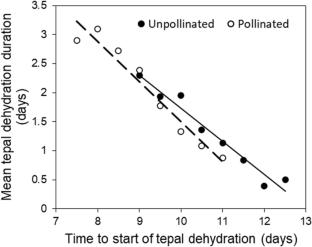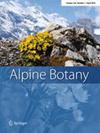Pollination-associated shortening of the functional flower lifespan in an alpine species of Alstroemeria and the water content of flowers
Abstract
Pollination-induced flower senescence is expected in species of dry habitats with large long-lived water-demanding flowers as means for reducing floral maintenance costs. We investigated this hypothesis in Alstroemeria umbellata, an alpine species of the semiarid central Chilean Andes. Pollinator-excluded flowers were submitted to hand cross-pollination and manual pollen removal and monitored twice daily to assess the time spans of four floral stages and two expressions of flower longevity. Wilting and floral stage duration responses in open-pollinated flowers were studied. Ramet-level floral and leaf water content were quantified. Pollen removal had no effect on any floral trait analyzed. Hand cross-pollination reduced the functional flower lifespan from 7.5 to 6.7 days and the female stage from 3.4 to 1.6 days, but did not have a clear effect on the total flower lifespan (9.3 days). Counterintuitively, the length of the dehydration stage increased following pollination. No effect of pollination was detected in naturally pollinated flowers. Inflorescences contained > 3.5 g of water, > 3 times more than the ramet leaves, with > 50% of floral water housed in the turgid tepals. Although inflorescences contain much more water than the leaves, based on the open-pollination results, the amount of tepal water saved through pollination-associated floral senescence under natural circumstances is likely to be far less than the ~ 11% predicted by the manipulative experiment. Knowledge of tepal and leaf transpiration rates and the water content of underground plant parts is desirable to arrive at a more precise assessment of the impact of pollination-associated floral senescence on the water balance in A. umbellata.


 求助内容:
求助内容: 应助结果提醒方式:
应助结果提醒方式:


